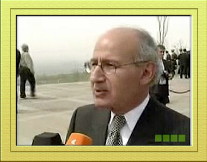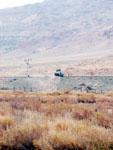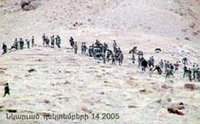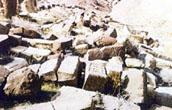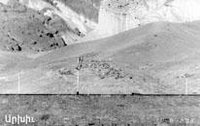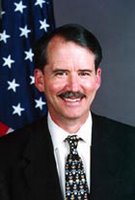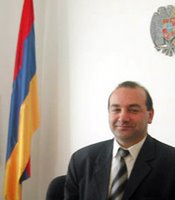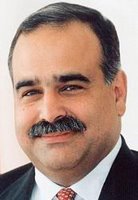www.hetq.am
[December 19, 2005]Timeline: The US State Department's 2005 Trafficking in Persons Report places Armenia on its “Watch List” (countries that require special supervision).
March 16, 2005. The Prosecutor General of the Republic of Armenia creates a new department to fight human trafficking.
March 30, 2004. The Armenian Government and the UNDP approve the Anti-Trafficking Programme: Capacity Building Support and Victims Assistance project.
January 15, 2004. The Armenian Government approves a 2004-2006 national program to stop the trafficking and illegal trade of women.
August 2003. According to the new Armenian Criminal Code, human trade and trafficking becomes a criminal offense.
March 25, 2003. Armenia ratifies the UN Convention Against Transnational Organized Crime.
October 14, 2002. The Armenian prime minister creates a new committee to study the illegal trafficking and subsequent exploitation of women from Armenia and propose solutions for this problem.
2002. The Armenian government decides to take the issue of trafficking seriously, after Armenia is placed on Tier 3 of the US State Department's Trafficking in Persons Report (countries that ignore the issue and do not undertake proactive steps to solve it).
Anti-Trafficking Programs
“Everything began in 2001, when we met 59 victims of trafficking, discussed their cases, and notified the Armenian government. But the government determined that there was no trafficking in Armenia and that it was too early to talk about ‘modern slavery',” explained Hrach Kajhoyan, coordinator of the International Organization for Migration (IOM) programs. “It was only after the US State Department's report that the government decided to take action and to work with the IOM.”
Since 2002, the IOM's Yerevan branch has been implementing programs in several areas. These include retraining consulate and embassy workers, retraining and providing technical support for law enforcement anti trafficking departments, increasing awareness of the issue amongst the populace, and helping the victims of trafficking.
“In the beginning everyone had a wrong understanding of the issue. But now I can say that seminars, round tables, conferences, and discussions with international experts have yielded positive results. Now government officials in the various agencies know what trafficking is and how to fight it in a proactive way,” Kajhoyan continued.
The IOM also assisted the local NGO Hope and Help, which works with the victims of trafficking. They run a hotline and a shelter, providing psychological, legal and medical support.
“We've worked with 32 people,” explained Enok Satvoryan, the director of Hope and Help. “It's hard to get in contact with the victims, and help them understand that they are victims of trafficking. We help them as much as we can; we file the necessary documents and give them a place in our shelter. There will be a need for programs like this in Armenia until people stop dreaming of leaving this country.”
In March 2004, the Armenian government and UNDP approved the Anti-Trafficking Programme: Capacity Building Support and Victims Assistance project. The UNDP program is implemented with the help of the Armenian branches of the IOM and the United Methodist Committee on Relief (UMCOR) and has three main directions: supporting anti-trafficking, raising awareness of the issue, and helping victims.
The governments of Norway and the Netherlands have provided $650,000 for implementation of the program. It is scheduled to end in May 2006, but most likely will be extended.
The UNDP assists the government in creating an effective anti-trafficking policy by introducing legislation improvements, providing the victims with medical support and helping them reintegrate into society, and improving the coordination of anti-trafficking efforts in the region. A network of local NGOs, reporters covering the issue, and journalists' organizations has been created to promote greater coordination and effectiveness.
“To improve anti-trafficking efforts, we are trying to create an efficient channel of communication between all the parties involved—the government, NGOs, and international organizations. UNDP subcontractors UMCOR and the IOM are also working on the ‘raising awareness' part of the program,” said Aida Khazaryan, coordinator of the UNDP anti-trafficking program.
“Our part of the program is called ‘Helping the victims of trafficking and forced prostitution.' We are implementing it working with the NGO Democracy Today,” said project director Viktoria Avakova. “In the beginning it was hard, as government officials from different departments did not differentiate trafficking from prostitution, and victims did not realize that they were victims. Now the situation is different. Social workers and doctors know how to treat people who are victims of trafficking and the victims now trust us.”
UMCOR works in several directions, raising awareness of the issue amongst the populace, providing support to the victims, and training social workers and employment agency and hospital personnel.
In 2004, it opened a support hotline to provide assistance to the victims. The hotline has received 1,000 calls so far, 16% of them related to trafficking and similar incidents. The victims are given advice and a place in the shelter. “We have worked with 14 people so far. Regardless of whether the victim stays in our shelter or not, our experts provide legal, psychological, and medical assistance. But our support for the victim doesn't end there. We work with local employment agencies and if there is an appropriate vacancy, we send the victim to a take whatever course is necessary, so she hopefully will find a job,” Avakova continued.
To raise awareness, announcements have been printed in newspapers and aired on TV and radio. Seminars have been organized for NGO workers and government officials.
The IOM works in the regions as well, presenting the trafficking issue in a play called Burning Candles , which tells the story of a woman who becomes a victim. “We perform the play in the regions. We have already done it in Gyumri, Charentsavan, Vanadzor, Yeghegnadzor and Goris. After the play, we discuss the issue with local organizations and give them information so that they can do their work in the regions. Sometimes the local TV channels do news reports on the issue. We also provide a video of theatre play, so it can be aired on TV, too,” said program consultant Lusine Melkonyan.
to be continuedAghavni Yeghyazaryan


